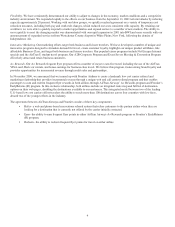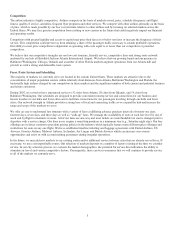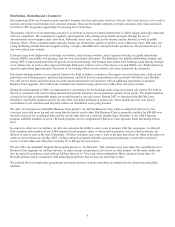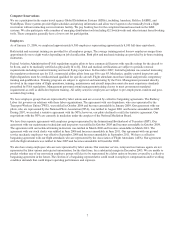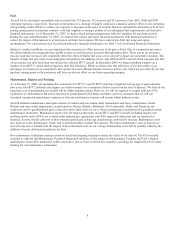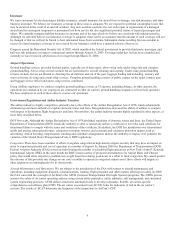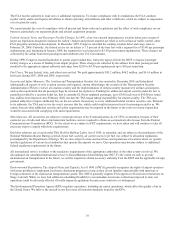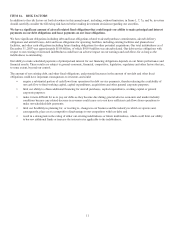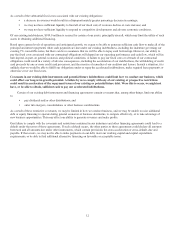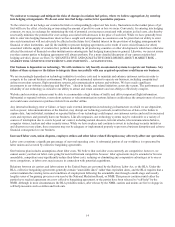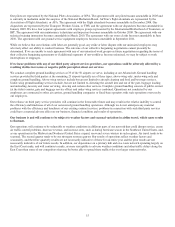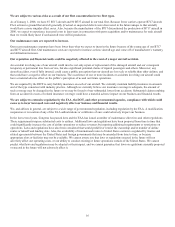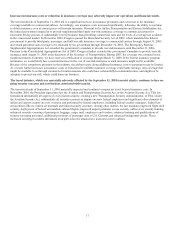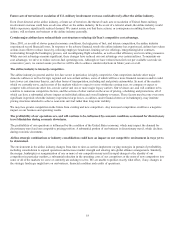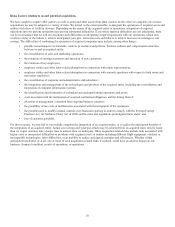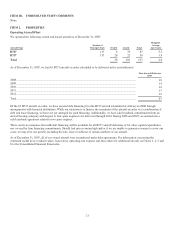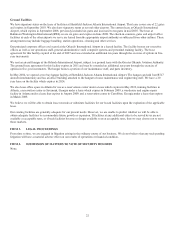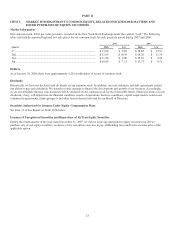Airtran 2007 Annual Report Download - page 20
Download and view the complete annual report
Please find page 20 of the 2007 Airtran annual report below. You can navigate through the pages in the report by either clicking on the pages listed below, or by using the keyword search tool below to find specific information within the annual report.
14
We endeavor to manage and mitigate the risks of changes in aviation fuel prices, where we believe appropriate, by entering
into hedging arrangements. We do not enter into fuel hedge contracts for speculative purposes.
To the extent we do not hedge our aviation fuel risk or correspondingly adjust our fare levels, fluctuations in the market prices of jet
fuel will have the effect of reducing or increasing the amount of profit we earn or loss we incur. Conversely, by entering into hedging
contracts, we may, in exchange for minimizing the risk of potential cost increases associated with aviation jet fuel costs, also thereby
necessarily minimize the potential for cost savings associated with decreases in the price of such fuel. While we have generally been
able to enter into hedging transactions when we have sought such arrangements, no assurances can be given that our ability to enter
into such transactions will not adversely be affected in the future by (i) limited interest in the provision of hedging arrangements by
financial or other institutions, and (ii) the inability to procure hedging agreements as the result of some crisis (financial or other)
associated with the supply of aviation fuel, political instability in oil producing countries or other developments which have otherwise
affected the interest of financial or other institutions in entering into fuel hedging transactions in general. Likewise, we can not assure
you that counter parties to hedging agreements will always perform. For a more detailed discussion of our current aviation fuel
hedging activities, please see Item 7A “QUANTITATIVE AND QUALITATIVE DISCLOSURES ABOUT MARKET RISK –
MARKET RISK SENSITIVE INSTRUMENTS AND POSITIONS – AVIATION FUEL.
Our business is dependent on technology. We will continue to rely heavily on automated systems to operate our business. Any
failure of these systems or the failure to integrate them successfully with any acquired operations could harm our business.
We are increasingly dependent on technology initiatives to reduce costs and to maintain and enhance customer service in order to
compete in the current business environment. We depend on automated systems to operate our business, including computerized
airline reservation systems, flight operations systems, telecommunication systems and websites. We have made significant
investments in our website technology and Bye-Pass ™ check-in kiosks, and related initiatives across the system. The performance and
reliability of our technology is critical to our ability to attract and retain customers and our ability to effectively compete.
Website and reservation systems must be able to accommodate a high volume of traffic and deliver important flight information.
Substantial or repeated website, reservations systems or telecommunication systems failures could reduce the attractiveness of services
and could cause customers to purchase tickets from another airline.
Any internal technology error or failure, or large scale external interruption in technology infrastructure on which we are dependent,
such as power, telecommunications or the Internet, may disrupt our technology network, result in the loss of data or the failure to
capture data. Any individual, sustained or repeated failure of our technology could impact our customer service and result in increased
costs and expenses and generally harm our business. Like all companies, our technology systems may be vulnerable to a variety of
sources of interruption due to events beyond our control, including natural disasters, terrorist attacks, telecommunications failures,
computer viruses, hackers and other security issues. While we have in place and continue to invest in technology security initiatives
and disaster recovery plans, these measures may not be adequate or implemented properly to prevent a business disruption and adverse
financial consequences to our business.
Increased labor costs, union disputes, employee strikes and other labor-related disruption may adversely affect our operations.
Labor costs constitute a significant percentage of our total operating costs. A substantial portion of our workforce is represented by
labor unions and covered by collective bargaining agreements.
Our business plan includes assumptions about labor costs. We believe that our labor costs currently are competitive; however, we
cannot assure you that our labor costs going forward will remain competitive because: labor agreements may be amended or become
amendable, competitors may significantly reduce their labor costs, reducing or eliminating any comparative advantages as to one or
more competitors, or labor costs may increase in connection with potential acquisitions.
Relations between air carriers and labor unions in the United States are governed by the Railway Labor Act, or the RLA. Under the
RLA, collective bargaining agreements generally contain “amendable dates” rather than expiration dates, and the RLA requires that a
carrier maintain the existing terms and conditions of employment following the amendable date through a multi-stage and usually
lengthy series of bargaining processes overseen by the National Mediation Board, or NMB. This process continues until either the
parties have reached agreement on a new collective bargaining agreement, or the parties have been released to “self-help” by the
NMB. Although in most circumstances the RLA prohibits strikes, after release by the NMB, carriers and unions are free to engage in
self-help measures such as strikes and lock-outs.


